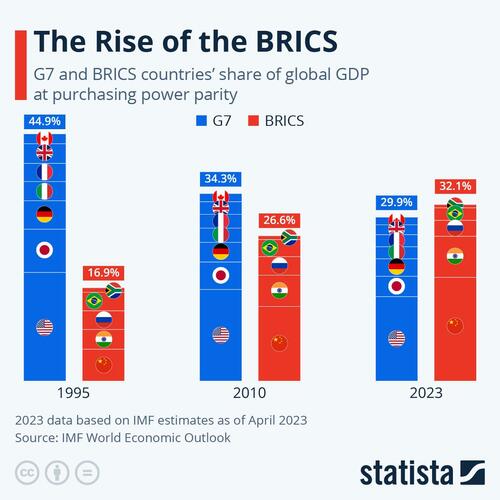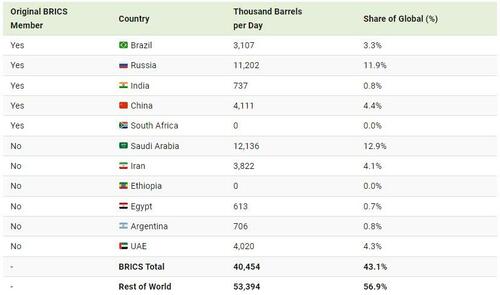luiza
Diamond Member
The next few months will advance global de-dollarisation by the inclusion of Iran , Saudi Arabia and the UAE into BRICS . Further new members are scheduled for later next year. Americas world economic and financial platform will quickly fade away and developing continents like Africa and South America will collectively breathe huge sighs of relief . Set up in 2009, the BRICS nations represent some 40% of the world’s population and significantly over a quarter of the world’s GDP. And now with Saudi Arabia, the UAE and Iran set to enter the fold, it will have three of the world's biggest oil producers.
In Putin's virtual address the day prior, he emphasized that de-dollarization is "gaining momentum". He said the dollar's receding global centrality is an "objective and irreversible" process.
* * *
As Statista observes it fresh recent analysis, Despite the aforementioned three failing to pull their expected weight, the five BRICS nations surpassed the G7 in terms of their combined GDP in 2020. That is when measured at purchasing power parity, i.e. adjusted for differences in buying power. According to the IMF, the bloc will collectively account for 32.1 percent of global GDP this year. That’s up from just 16.9 percent in 1995 and more than the G7’s share of 29.9 percent.

You will find more infographics at Statista
The rise of the BRICS nations, while not without challenges and disparities within the group, has led to increased calls for more inclusive and representative global governance, adding more weight to voices that deviate from the policies shaped by the Western-led G7. Nowhere has that deviation been more apparent than in the response to Russia’s invasion of Ukraine. While the G7 condemned the attack and imposed strict sanctions on Russia, none of the BRICS members have denounced Russia’s actions or joined in on the sanctions.
Bulk of OP from a report in the leading news source, Zero Hedge , earlier today .
In Putin's virtual address the day prior, he emphasized that de-dollarization is "gaining momentum". He said the dollar's receding global centrality is an "objective and irreversible" process.
* * *
As Statista observes it fresh recent analysis, Despite the aforementioned three failing to pull their expected weight, the five BRICS nations surpassed the G7 in terms of their combined GDP in 2020. That is when measured at purchasing power parity, i.e. adjusted for differences in buying power. According to the IMF, the bloc will collectively account for 32.1 percent of global GDP this year. That’s up from just 16.9 percent in 1995 and more than the G7’s share of 29.9 percent.

You will find more infographics at Statista
The rise of the BRICS nations, while not without challenges and disparities within the group, has led to increased calls for more inclusive and representative global governance, adding more weight to voices that deviate from the policies shaped by the Western-led G7. Nowhere has that deviation been more apparent than in the response to Russia’s invasion of Ukraine. While the G7 condemned the attack and imposed strict sanctions on Russia, none of the BRICS members have denounced Russia’s actions or joined in on the sanctions.
Bulk of OP from a report in the leading news source, Zero Hedge , earlier today .
